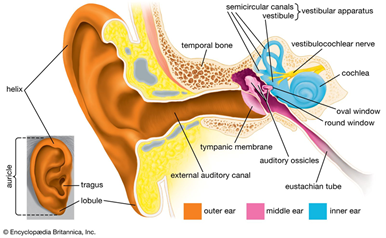Ear Care
The ear is both an internal and external sensory organ with three distinct sections:
Outer Ear
This is the visible portion of the ear, as well as the external auditory (ear) canal, the channel to the eardrum. The external canal is about one inch long, formed of cartilage and bone, and lined with a thin layer of skin that is very sensitive to pain. The outer ear is subject to infection, injury, wax build-up, foreign bodies, and itching, amongst other things.
Middle Ear
This refers to the tympanic membrane (ear drum), tiny ear bones, and air spaces behind the ear drum. The middle ear is separated from the outer ear by the tympanic membrane and is connected to the throat by the Eustachian tube. The middle ear is sensitive to pressure changes and easily troubled by nose and throat infections and allergies. Chronic infections, injuries, or very loud noises can lead to hearing loss.
Inner Ear
This is the deepest part of the ear. It controls balance and houses nerve endings that carry messages to the brain. The inner ear is susceptible to injury, loud noise, infection, chemical toxicity, chronic disease, and birth defects that can cause hearing loss, loss of balance, or ringing in the ears (tinnitus).
Common Ear Problems
- Swimmer's Ear (external otitis) is an inflammation of the lining of the external canal due to prolonged water exposure or irritation caused by "cleaning" or “scratching” with Q-tips/cotton swabs, hair pins, paper clips, etc. Symptoms vary from mild itching to severe pain, drainage, and mild hearing loss. Treatment generally includes antibiotic drops, keeping ears dry, and avoiding further use of Q-tips/cotton swabs, hair pins, paper clips, etc.
- Surfer's Ear (exostosis) is a condition typically seen in saltwater enthusiasts where the bony portion of the external canal becomes thickened and eventually creates knob-like projections, possibly due to cold water exposure. Over time, these growths may close the ear canal causing significant hearing loss. The condition is painless and may go unnoticed for a number of years until hearing loss becomes obvious. Surgical correction by a specialist may be necessary to restore normal hearing.
- Traveler’s Ear (barotitis) occurs when middle ear pressure is not equalized after high altitude travel or scuba diving. Symptoms include a "plugged" feeling, hearing loss, ringing in ears, pain, and dizziness. The pain of barotitis may become intense over a few hours. Anyone with head congestion may be especially prone to barotitis. Use of decongestants and nose sprays may decrease the symptoms. Chewing, yawning, and remaining awake during descent in altitude can also help. Scuba divers must take extra precautions and never dive when congested.
- Middle Ear Infection (otitis media) is an inflammation of the middle ear causing fever, pressure changes (popping), severe pain, hearing loss, and dizziness. If the eardrum perforates, a bloody or purulent drainage may flow from the affected ear. The symptoms of otitis media may follow a cold or sore throat. Treatment depends on physical exam findings but generally includes use of decongestant and fever/pain-reducing medications. Recurring otitis media may require special surgical correction placing tubes in the eardrums.
- Ringing or Buzzing of the Ear (tinnitus) may develop due to exposure to loud noise, smoking, viral infection, head injury, or excessive use of certain medications, such as aspirin. This symptom should be evaluated by an ear specialist.
- Earwax Build-Up (ceruminosis) is a large amount of earwax (cerumen) that diminishes hearing. Ringing in the ear and a plugged or full feeling in the ear may also occur. Wax is produced naturally by the ear to protect the external ear canal. Overproduction of earwax can cause wax buildup, leading to a blockage of this canal. Ear lavage, known as irrigation, is often used to gently remove the impacted wax. Using Q-tips/cotton swabs or other objects should be avoided as this worsens the problem by pushing the wax further into the ear canal. If wax build-up is a regular occurrence, using wax softening ear drops may be an option.
Tips for Hearing Protection
- Loud, intense noise can lead to permanent hearing loss. For unprotected ears, 80 decibels and up (jet engines, rock concerts, factory noise) can cause nerve deafness that cannot be corrected. Use ear plugs/ear protectors and avoid loud noises.
- Earaches require medical attention and strict adherence to medical advice. If treatment includes an antibiotic, follow all directions from the medical provider for therapy completion.
- Scuba diving or flying in an unpressurized plane when symptoms of a cold are present can lead to severe pain and hearing loss. These activities should be postponed until the symptoms have cleared. Sudafed or a similar decongestant may help. Never wear ear plugs while scuba diving.
Learn more about ear care and hearing protection from Centers for Disease Control, American Hearing & Audiology, and Cleveland Clinic.
